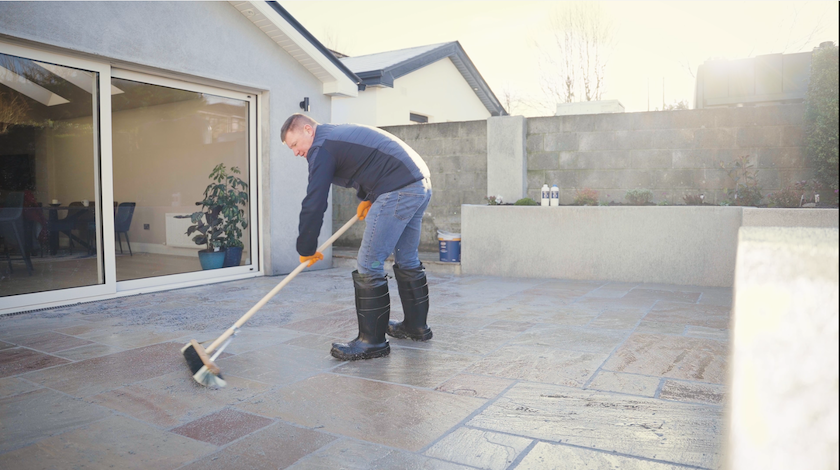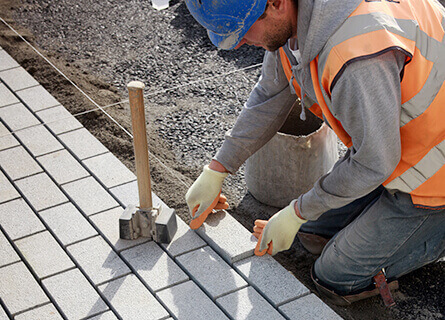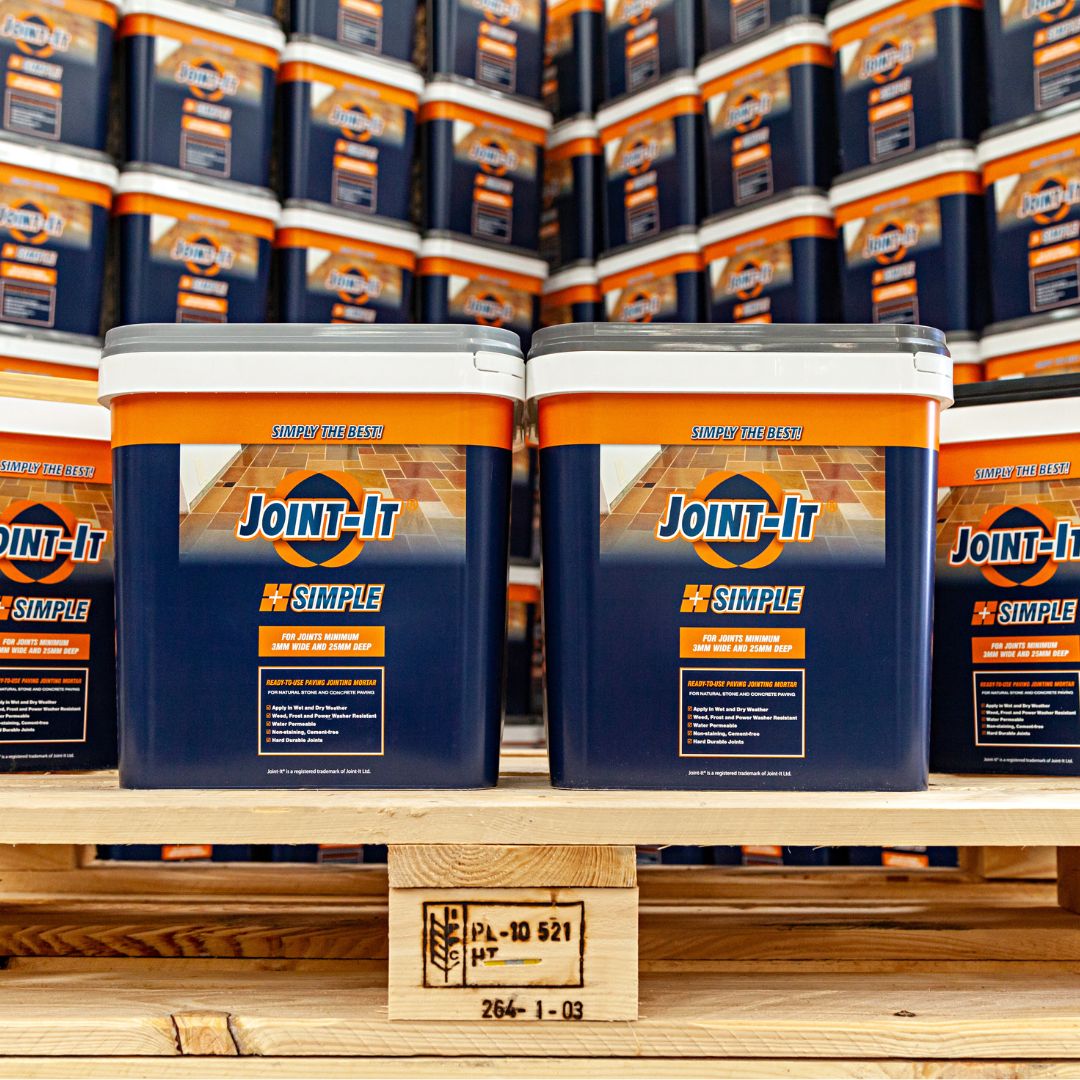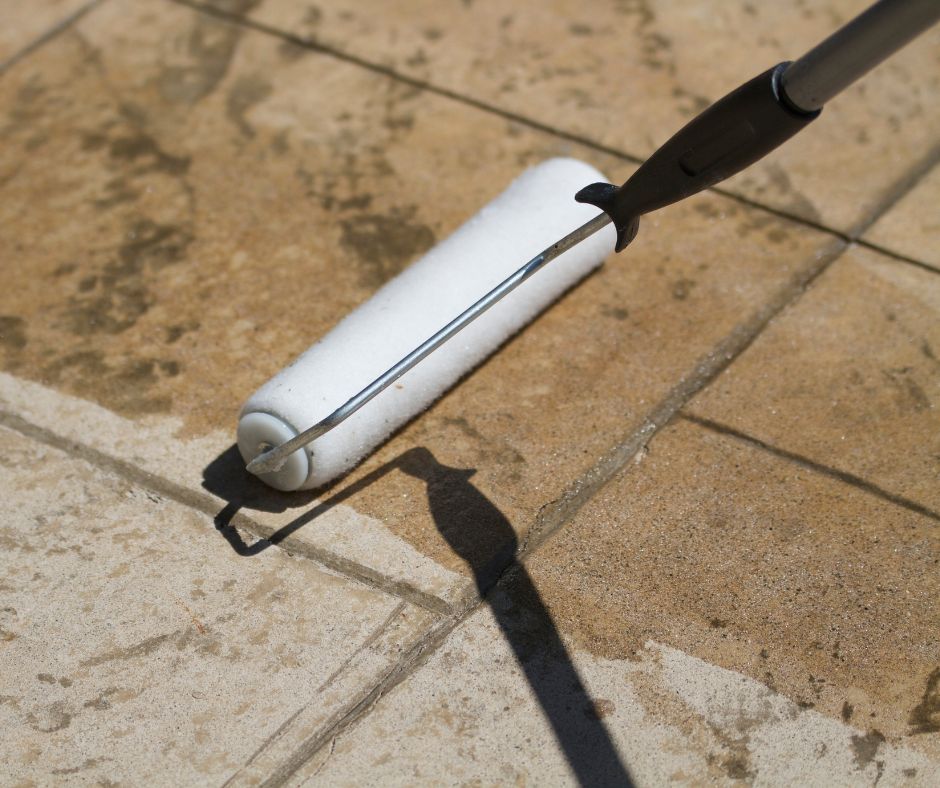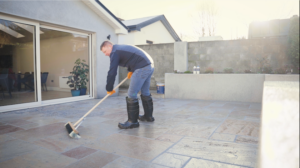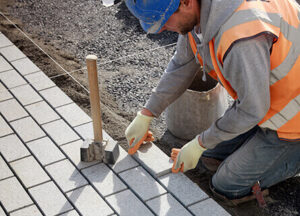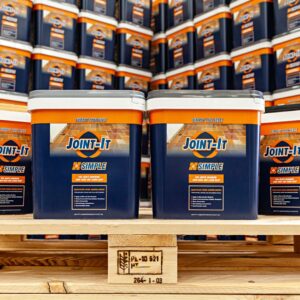Paving grouts to anyone who isn’t an experienced landscaping contractor can appear mighty complex as they come in many different types. There are brush-in grouts like EASYJoint, flowable slurry grouts like UltraScape Flowpoint, epoxy resins or traditional sand and cement. When you’ve spent huge amounts of time and money selecting the ideal Indian sandstone pavers, limestone slabs or granite setts for your perfect patio, it’s important to get the grout product, colour and texture right to compliment it. The last thing that you need a few months or years later, is a patio that has cracked or crumbling grout or weeds growing through your paving joints.
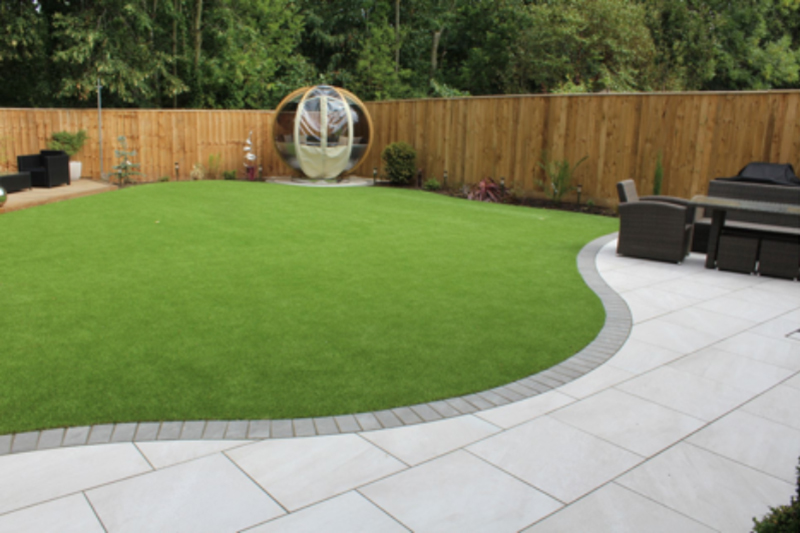
So what do you need to know?
There are many different patio grouts or jointing compounds that you can use. You’ll need to consider what type of slabs you have, what you are bedding your slabs onto, how long you need the grout to last, what colour and finish you’d like, the weather conditions you are laying your slabs in and of course what your budget is.
What are the different types of paving grout?
There are six main types of grout!
- Single part polymeric compounds – finely sanded, sweep or brush-in grout like EasyJoint, UltraScape PaveJoint Plus, Joint-It, ProJoint Fusion & Geofix All Weather
- Single-part epoxy resins – such as Nexus ProJoint Fusion Max
- Two-part epoxy resins – such as Nexus ProJoint V75-WT & Nexus ProJoint V400-WT
- Exterior tile grouts – like Nexus ProJoint Porcelain Paving Grout
- Cementitious-based slurry grouts – such as Ultrascape Flowpoint Standard, Smooth & ECO
- Traditional mortar – sand & cement mix
What is a brush-in or sweep-in grout?
A brush-in grout is a dry sand & cement mix that is pre-mixed, simple to use, cost-effective, so that you can just pour it straight out of the tub and sweep it into the joints. It comes in lots of colours to compliment lighter limestone through to darker granite.
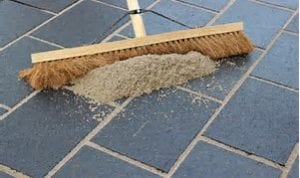 If you are laying a patio for the first time, or need something that’s quick, simple and effortless then a single part polymeric compound or more commonly known as a brush-in grout such as EASYJoint or Geofix All Weather could be for you! These grouts are ready made in the bucket, simple and quick to apply – it’s difficult to make a mistake. Brush-in grouts can be used on any type of paving slabs; natural stone, granite setts or concrete pavers. You simply wet your paving thoroughly first, ensuring that there is no ponding water or dry patches and then pour the brush in grout over the paving, pushing it into the paving joints with a squeegee and a brush. You have the option to leave it there, but for a neater, longer lasting joints ‘strike’ it off with a jointer, compacting it into the joint, once it has dried a little so the product firms up.
If you are laying a patio for the first time, or need something that’s quick, simple and effortless then a single part polymeric compound or more commonly known as a brush-in grout such as EASYJoint or Geofix All Weather could be for you! These grouts are ready made in the bucket, simple and quick to apply – it’s difficult to make a mistake. Brush-in grouts can be used on any type of paving slabs; natural stone, granite setts or concrete pavers. You simply wet your paving thoroughly first, ensuring that there is no ponding water or dry patches and then pour the brush in grout over the paving, pushing it into the paving joints with a squeegee and a brush. You have the option to leave it there, but for a neater, longer lasting joints ‘strike’ it off with a jointer, compacting it into the joint, once it has dried a little so the product firms up.
What is an epoxy grout?
Epoxy grouts most commonly come as single and two-part epoxy resins, which are typically made up of a bag of aggregate sand based material and a little bottle of resin that you simply mix together in a bucket to form a slurry mix.
Epoxy grouts tend to be used by professional landscapers, but there is nothing to be scared about – they can be used by anyone even those not familiar with grouting their patio for the 1st time. Follow the instructions carefully and you shouldn’t go wrong. Don’t be afraid to ask the manufacturer for their technical data sheets and any videos or other information that they have to help you.
The aggregate and sand is mixed together in a bucket with the resin, the mix is then poured across your ‘moist’ pavers and brushed or squeegeed into the joints. It’s really important to keep your paving moist whilst applying your epoxy and we’d also advise sealing your paving prior to jointing, this will ensure that you do not end up with staining or picture framing.
Epoxy grout is usually better applied if there are two people working on a project together, so that one can keep the pavers wet and the other brush in the paving grout. Epoxy grout once hardened can typically last 10 years or more, and if you like to jet wash your patio regularly it can be a more robust option.
What is an exterior tile grout?
An exterior tile grout can apply to any jointing mortar, but typically an exterior tile grout is more associated with narrow joints, they have finer aggregates for slabs such as porcelain. Typically these come in a tub, and are simply mixed with water and applied to the tile joints with a rubber float or squeegee. A washboy tends to be used to clean the surface of the tiles, with a final clean off with a soft cloth to remove the last remaining spots of adhesive.
What is a cementitious-based slurry grout?
A slurry grout is a flowable, wet, cement-based mortar which is poured across the paving slabs, and easily fills the joints without the need for getting on your hands and knees, as with a traditional sand & cement mix!
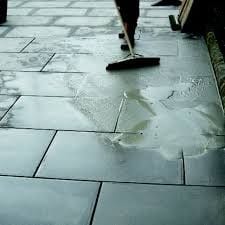 There are many flowable slurry grouts on the market but we highly recommend Ultrascape Flowpoint, it’s trusted by the major contractors across the world for big urban streetscape projects and it has a beautiful finish. Flowpoint lasts up to 40 years and the slurry grout fills joints from 5mm to 50mm wide and can go as deep as 200mm in one application. The benefit of Flowpoint Slurry grout is that it’s easy to apply and sets quickly, it prevents weeds and is pressure washer safe too, so that you can clean your patio without fear of the mortar popping out of the joints.
There are many flowable slurry grouts on the market but we highly recommend Ultrascape Flowpoint, it’s trusted by the major contractors across the world for big urban streetscape projects and it has a beautiful finish. Flowpoint lasts up to 40 years and the slurry grout fills joints from 5mm to 50mm wide and can go as deep as 200mm in one application. The benefit of Flowpoint Slurry grout is that it’s easy to apply and sets quickly, it prevents weeds and is pressure washer safe too, so that you can clean your patio without fear of the mortar popping out of the joints.
Flowable grouts tend to come in 25KG bags and are mixed from dry cement powder in a bucket with water for about 3-5 minutes, to a thick batter mix consistency and then poured across the paving slabs. Using a rubber squeegee the mixture is forced into the joints and a constant misting of water keeps the area wet and stops staining. Flowpoint slurry grout is then left to cure until it starts to set before being lightly washed off. Once it’s set you pressure wash the area to remove any last bits of mortar and you are left with a beautifully grouted patio.
Cleo Canning of The Paving Experts says, “Flowpoint produces a really beautiful joint that’s hardwearing and will last for years.
“A few tips we often share are to always mix a little grout up at a time, work on a small area and keep the area you are working on moist whilst you squeegee the grout into the joints, start to wash the Flowpoint off as it sets, this way you’ll prevent any remaining grout sticking to the slabs once you’ve finished.”
For more insider tips, see how to avoid overwatering and expert landscaping tips for using Flowpoint.
What is a traditional Sand & Cement Mix?
Many contractors still like to use traditional methods, and there is nothing wrong with this – a sand & cement mix is typically four parts sand, to one part cement. This is mixed with water and trowel applied into joints, the joints are then ‘struck’ with a jointing gag to give them a smooth, even and compact finish. The downside of this type of mix is that it should only be used on a dry day, if there is any moisture on your paving slabs it may result in staining. When applied correctly this method gives a really strong joint which should last for years, though due to the pointing method it can be very labour intensive and hard on your knees!
What else should we consider when grouting our patios?
All of the grouts we’ve talked about have their pro’s and con’s, some are easier to use than others, some last longer than others and some are cheaper than others. The most important thing is that whichever grout you choose, you must follow the manufacturer’s instructions carefully so that your patio is free from residue and staining, so that you have a patio you’ll be pleased with for years to come.
You can generally use any of the grouts we’ve mentioned on a permeable sub-base, but only a few grouts such as UltraScape Flowpoint are suitable for a non-permeable base due to the fact that they do not allow water to drain through them easily.
And as a final tip, if you want a perfectly grouted patio without any risk of staining then we always advise customers to pre-seal their paving before installation with products such as EASYSeal or UltraScape Paving Guard.

